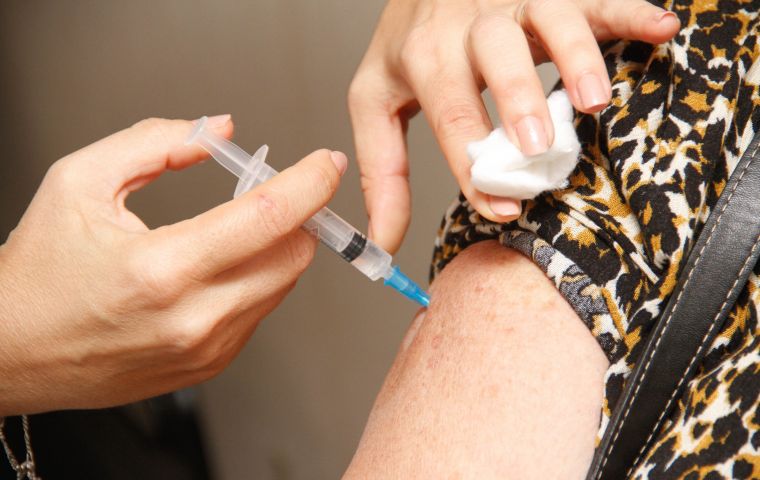MercoPress. South Atlantic News Agency
Salinas said Uruguay has enough supply of the Pfizer vaccine
 Salinas said Uruguay has enough supply of the Pfizer vaccine
Salinas said Uruguay has enough supply of the Pfizer vaccine Uruguay's Health Minister Daniel Salinas Wednesday announced that additional vaccination centers would be opened for the administration of booster doses of the COVID-19 immunizer.
In view of the increase in the number of cases, the country's vaccination strategy has been reshaped so as to prioritize people over 50 years of age and those immunocompromised.
The new posts will operate around the clock and without the post-injection 15-minute wait, it was explained. Uruguayan authorities have also confirmed that the drug to be used is the one manufactured by the Pfizer laboratories.
“There are 68 COVID vaccination posts and 400 for the expanded immunization program, but the idea is to have a significant number of posts operating full time every day next week and the following week,” Salinas explained.
“The good thing is that it is going to be without agenda, without delays of 15 minutes and also there are sufficient quantities of vaccine available,” he added.
In Uruguay, 58% of the population has taken three doses and only 22% are immunized with four doses.
The MSP recommends maintaining the usual hygiene measures and completing the vaccination schedule.
“Afterwards, we will have a normal life and the usual measures, having ventilated places, no crowds in closed places, [and the] hygiene measures that we all know for three years of being so insisting with the subject, but there will be no restrictions,” Salinas said.
Meanwhile, Uruguayan researchers have disclosed their findings regarding COVID-19 transmission from humans to their pets. These results have been published in the Brazilian academic journal Memórias do Instituto Oswaldo Cruz.
The study describes the first SARS-CoV-2 strains circulating in pets in Uruguay and recommends pets of people infected with COVID-19 be kept in isolation, “although it is unlikely that infected pets play an active role in the transmission” of the virus.
”In the research, nasopharyngeal and fecal samples obtained in Uruguay were analyzed, seeking to identify the presence of the SARS-CoV-2 genome by quantitative polymerase chain reaction (qPCR). Using ARTIC enrichment and Illumina sequencing, complete genomes were obtained and serum samples were used for virus neutralization assays,“ the document stressed.
Of 24 dogs and 15 cats studied, SARS-CoV was detected in one individual of each species, which were found to be asymptomatic. ”The viral genomes were identical and belonged to the Uruguayan P.6 lineage of SARS-CoV-2. This accounts for a closeness and gene flow between the variant detected in humans and in domestic animals,“ the study also pointed out.
”Because of the susceptibility of animals to SARS-CoV-2, the study suggests that people with covid-19 limit contact with domestic animals to minimize transmission from human sources,“ it added.
The study also found that ”different lineages of SARS-CoV-2 infect dogs and cats, and that there are no specific variants adapted to domestic animals. The results of the study help to highlight the need for ongoing surveillance of domestic animals in close proximity to infected humans.”
The research concludes that further study of the role of animals in contact with humans was necessary to understand the viral and epidemiological dynamics of the malady, which entails regular surveillance of domestic animals as well as wild species.




Top Comments
Disclaimer & comment rulesCommenting for this story is now closed.
If you have a Facebook account, become a fan and comment on our Facebook Page!